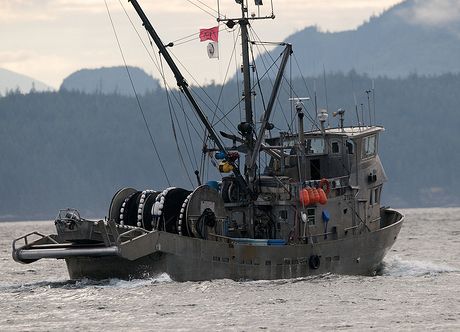One way to correct market failures is tax shifting — raising taxes on activities that harm the environment so that their prices begin to reflect their true cost and offsetting this with a reduction in income taxes. A complementary way to achieve this goal is subsidy shifting. Each year the world’s taxpayers provide at least $700 billion in subsidies for environmentally destructive activities, such as fossil fuel burning, overpumping aquifers, clearcutting forests, and overfishing. As the Earth Council study Subsidizing Unsustainable Development observes, “There’s something unbelievable about the world spending hundreds of billions of dollars annually to subsidize its own destruction.”
 A fishing trawler.Photo via winkyintheuk via FlickrThe perverse nature of harmful subsidies is especially apparent in the case of oceanic fisheries. Partly as a result of these subsidies, there are now so many fishing trawlers that their catch potential is nearly double the sustainable fish catch. Three fourths of ocean fisheries are now being fished at or beyond capacity or are recovering from overexploitation. If we continue with business as usual, many of these fisheries will collapse. The cod fishery off the coast of Newfoundland in Canada is a prime example of what can happen. Long one of the world’s most productive fisheries, it collapsed in the early 1990s and may never recover.
A fishing trawler.Photo via winkyintheuk via FlickrThe perverse nature of harmful subsidies is especially apparent in the case of oceanic fisheries. Partly as a result of these subsidies, there are now so many fishing trawlers that their catch potential is nearly double the sustainable fish catch. Three fourths of ocean fisheries are now being fished at or beyond capacity or are recovering from overexploitation. If we continue with business as usual, many of these fisheries will collapse. The cod fishery off the coast of Newfoundland in Canada is a prime example of what can happen. Long one of the world’s most productive fisheries, it collapsed in the early 1990s and may never recover.
In the end, governments need to eliminate fishery subsidies. Shifting these subsidies, which encourage destructive overfishing, to the creation of marine parks to regenerate fisheries would be a giant step in restoring oceanic fisheries. A U.K. team of scientists led by Dr. Andrew Balmford of the Conservation Science Group at Cambridge University has analyzed the costs of operating marine reserves on a large scale based on data from 83 relatively small, well-managed reserves. They concluded that managing a network of marine reserves governing 30 percent of the oceans would cost only $12–14 billion — much less than the $22 billion in harmful subsidies that governments dole out today to fishers. Balmford said, “Our study suggests that we could afford to conserve the seas and their resources in perpetuity, and for less than we are now spending on subsidies to exploit them unsustainably.”
Falling water tables pose another problem that could be partly addressed through subsidy shifting. The drilling of millions of irrigation wells over the last half century has pushed water withdrawals beyond recharge rates, in effect leading to groundwater mining. The failure of governments to limit pumping to the sustainable yield of aquifers means that water tables are now falling in countries that contain more than half the world’s people, including the big three grain producers — China, India, and the United States.
In some countries, the capital needed to fund a program to raise water productivity can come from eliminating subsidies that often encourage the wasteful use of irrigation water. Sometimes these are energy subsidies, as in India; other times they are subsidies that provide water at prices well below costs, as in the United States. Removing these subsidies would effectively raise the price of water, thus encouraging its more efficient use.
On the climate front, carbon emissions could be cut in scores of countries by simply eliminating fossil fuel subsidies. Iran provides a classic example of extreme subsidies when it prices oil for internal use at one tenth the world price, strongly encouraging car ownership and gas consumption. If its $37-billion annual subsidy were phased out, the World Bank reports, Iran’s carbon emissions would drop by a staggering 49 percent. This move would also strengthen the economy by freeing up public revenues for investment in the country’s economic development. Iran is not alone. The Bank reports that removing energy subsidies would reduce carbon emissions in India by 14 percent, in Indonesia by 11 percent, in Russia by 17 percent, and in Venezuela by 26 percent.
 Your tax dollars at work?Some countries are already doing this. Belgium, France, and Japan have phased out all subsidies for coal. Germany reduced its coal subsidy from a high of 6.7 billion euros in 1996 to 2.5 billion euros in 2007. Coal use dropped by 34 percent between 1991 and 2006. Germany plans to phase out this support entirely by 2018. As oil prices have climbed, a number of countries have greatly reduced or eliminated subsidies that held fuel prices well below world market prices because of the heavy fiscal cost. Among these are China, Indonesia, and Nigeria.
Your tax dollars at work?Some countries are already doing this. Belgium, France, and Japan have phased out all subsidies for coal. Germany reduced its coal subsidy from a high of 6.7 billion euros in 1996 to 2.5 billion euros in 2007. Coal use dropped by 34 percent between 1991 and 2006. Germany plans to phase out this support entirely by 2018. As oil prices have climbed, a number of countries have greatly reduced or eliminated subsidies that held fuel prices well below world market prices because of the heavy fiscal cost. Among these are China, Indonesia, and Nigeria.
A study by the U.K. Green Party, Aviation’s Economic Downside, describes subsidies to the U.K. airline industry. The giveaway begins with $18 billion in tax breaks, including a total exemption from the national tax. External or indirect costs that are not paid, such as treating illness from breathing the air polluted by planes, the costs of climate change, and so forth, add nearly $7.5 billion to the tab. The subsidy in the United Kingdom totals $426 per resident. This is also an inherently regressive tax policy simply because a part of the U.K. population cannot afford to fly, yet they help subsidize this high-cost travel for their more affluent compatriots.
While some leading industrial countries have been reducing subsidies to fossil fuels — notably coal, the most climate-disrupting of all fuels — the United States has increased its support for the fossil fuel and nuclear industries. Doug Koplow, founder of Earth Track, calculated in a 2006 study that annual U.S. federal energy subsidies have a total value to the industry of $74 billion. Of this, the oil and gas industry gets $39 billion, coal $8 billion, and nuclear $9 billion. He notes that today these numbers “would likely be a good deal higher.” At a time when there is a need to conserve oil resources, U.S. taxpayers are subsidizing their depletion.
A world facing economically disruptive climate change can no longer justify subsidies to expand the burning of coal and oil. Shifting these subsidies to the development of climate-benign energy sources such as wind, solar, biomass, and geothermal power will help stabilize the earth’s climate. Shifting subsidies from road construction to rail construction could increase mobility in many situations while reducing carbon emissions. And shifting subsidies from building logging roads to planting trees would also reduce carbon emissions while helping protect and restore forest cover worldwide.
In a troubled world economy where many governments are facing fiscal deficits, tax and subsidy shifts can help balance the books, create additional jobs, and save the economy’s eco-supports. Tax and subsidy shifting promises greater energy efficiency, cuts in carbon emissions, and reductions in environmental destruction — a win-win-win situation.
For more information on economic restructuring see “Lowering Income Taxes While Raising Pollution Taxes Reaps Great Returns” at www.earthpolicy.org/index.php?/book_bytes/2010/pb4ch10_ss2.
Adapted from Chapter 10, “Can We Mobilize Fast Enough?” in Lester R. Brown, Plan B 4.0: Mobilizing to Save Civilization (New York: W.W. Norton & Company, 2009), available on-line at www.earthpolicy.org/index.php?/books/pb4
Data and additional information available at www.earthpolicy.org




